They gathered near the Knesset. High school girls in modest skirts
color-matched with running tights, yeshiva students sporting brand-name running
shoes. Soldiers in uniform and start-up employees before the start of their
workday. Individuals, friends, youngsters and athletic adults, the experienced
and those here for the first time, everyone wearing the same lime green
dry-wear shirt. All waited for the announcement that would kick off the race.
The sky was blue and promising, the early morning air crisp and refreshing.
A perfect day for the Jerusalem Marathon. The main event, 42.2 kilometers long,
would take the runners through downtown Jerusalem and north all the way to Mt.
Scopus. The race circuit snaked through the Old City’s Jaffa Gate and along the
narrow alleyways of the Armenian Quarter. Out Zion Gate, around Mt. Zion, up a
steep hill to the old train station and through German Colony. South to the
Arnona neighborhood, back towards the city center, and down the home stretch to
the finish line at Sacher Park.
A festive day, carnival-like, for both the runners and those who came
to cheer them on. Municipality and national flags furled in the light breeze; colorful
balloons with the Marathon logo rose into the sky. Loud music competed with the
call of vendors at stalls selling sporting equipment and refreshments. Bottles
of mineral water were handed out to all who asked. And of course, a platform awaited
the medalists—the top three finalists in each race.
All of this Mordechai Hirschfeld saw on the small television screen hung
on the back wall of the lobby. He leaned forward in his wheelchair with great
anticipation for the race’s starting gun. The television camera scanned the anxious
faces of the runners crowded next to the starting line, and Mordechai shifted
his legs on their pedals, as if he, too, was waiting to run with them, to fight
for position and push forward until he had a clear straightaway where he could
pick up speed. He would show them, he thought.
“What are you doing, Mordie? Imagining you’re running in the
Marathon?”
Mordechai looked over at Spiegel, his neighbor from across the hall in
Beit Gilboa, the assisted living retirement home in southern Jerusalem. Spiegel
was sitting on a hard chair, a silver-framed walker parked at his side. “I was
a runner in my day,” Mordechai said proudly. “You should have seen me then. If
it wasn’t for my legs, I would be there now,” he said, pointing at the
television.
Read the rest of the story on San Antonio Review.

No comments:
Post a Comment